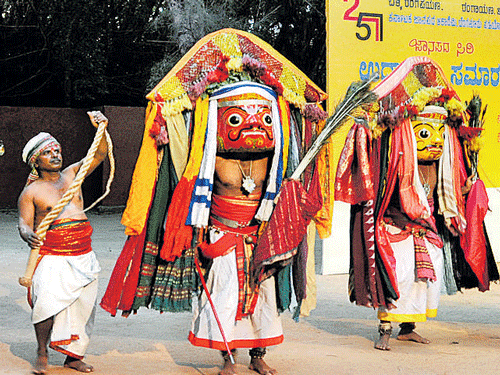A man was peeping through the glass partition of the director’s chamber at Rangayana repertory in Mysuru, only to grab the attention of the man in the seat, and subsequently succeeded in meeting the director.
The person, a theatre enthusiast, had come all the way from Damadahalli, a village in the neighbouring Mandya district, with a purpose. He wanted a street play, recently produced by Rangayana, to be staged in his village and other surrounding areas to create awareness among rural people, particularly farmers. Director H Janardhan replied in positive and agreed to include the village on the itinerary of the Repertory’s forthcoming theatre tour.
Beyond mainstream
The play that stirred this villager is Annadatha Namma Raitha (our farmer, the food producer) that was staged as a part of Belli Ranga Payana, organised in the month of August to celebrate the Repertory’s silver jubilee year. The play was conceptualised in keeping with the present agrarian crisis that has rocked the State and was staged under the Janapada Siri event of Belli Ranga Payana. The event was organised in collaboration with Karnataka Janapada Academy.
It is just part of a bigger narrative where Rangayana transcends beyond the stage and works towards the greater common good. In fact, such activities have helped realise the vision of theatre doyen B V Karanth, the Repertory’s founder director, who was instrumental in the formation of Rangayana. The Repertory, which made a humble beginning in 1989, has grown into a hub of activities, staging a host of plays, performed by amateur or professional artistes, every weekend.
Rangayana has influenced the theatre atmosphere in the State through a spectrum of innovative initiatives. One such effort is the weekend drama concept, the first of its kind experiment, where two different plays are staged on Saturdays and Sundays. During Dasara, Navaratri Rangotsava brings an array of plays, while during Bahuroopi, a national level theatre festival, it is a melange of productions, that serves theatre on a platter to the cognoscenti. Bahuroopi, which brings together plays from different languages and cultures from across the country, has been enthralling the audience for the last 13 years. Most importantly, the themes of Bahuroopi focus on relevant social issues. When severe drought rocked the State in 2004, the plays highlighted farmers’ plights. Another year, plays stressed the judicious use of water and other natural resources.
To identify and encourage budding artistes, Ranga Shikshana, a one-year diploma course in theatre, was introduced five years ago. Here, students are given exposure to various aspects involved in the production of a play such as costumes, make-up, acting and lighting. Chinnara Mela is the summer escape for students in a particular age group, while children’s theatre is another focus area, followed by College Rangotsava and Havyasi Rangotsava to encourage students and amateur artistes respectively.
Drawing inspiration from B V Karanth’s untiring efforts to develop theatre as a medium of entertainment and a tool for social change, his successors C Basavalingaiah, Prasanna, Chidambara Rao Jambe, B Jayashri, Lingadevaru Halemane and B V Rajaram (of Ajithana Sahasagalu fame) have contributed significantly to the realisation of Rangayana’s goals.
Janardhan, who was associated with B V Karanth for long, recalls circumstances that led to the birth of Rangayana. B V Karanth was at the helm of National School of Drama (NSD) in Delhi, as its director, in the late 1970s. Later he worked in Bhopal at the Rangamandala repertory. It was there he indeed found his true calling by turning tribals into artistes. It did not take much time for Karanth to look back at his home state and hence the quest for a repertory began.
Stage impressions
Before zeroing in on Mysore (now Mysuru), there were talks of identifying suitable locations at Davangere (known for drama companies). Later, when Mysore was finalised, an ideal location was found adjacent to Kukkarahalli Lake, where the Repertory is functioning now, behind Kalamandira, an auditorium of the Kannada and Culture Department.
Many do not know, it was a theatre workshop for lecturers and professors that marked the beginning of the Repertory. The participants at the workshop staged a play, King Lear, in the open ground.
Vanaranga, an open-air theatre, was built in this place after a few years. It was followed by another play, Hayavadana, in the cellar of Kalamandira that later became Bhoomigeetha auditorium. The process of selecting artistes began in 1988. The response was overwhelming with 850 applications received for the same. Eventually, 24 artistes were selected, of whom 18 continue with the Repertory even now.
Till date, Rangayana has about 100 productions to its credit, many of which are considered as milestone productions. Kindarijogi, Kusuma Bale, Chirebandi Wade, Pugalendi Prahasana, Midsummer Night Dreams, Hamlet, Kusumabale are some of the ever-popular productions. Malegalalli Madumagalu, a drama based on Rashtrakavi Kuvempu’s novel with the same name, has set a new chapter in the Kannada theatre scene. Directed by C Basavalingaiah, former Rangayana director, the drama was staged overnight with different intervals. Janardhan, the present director, has successfully adapted Samskara, a popular novel of U R Ananthamurthy, into theatre during the silver jubilee celebrations.
With an aim to nurture regional theatre sensibilities and local culture, Rangayana has spread its wings to Kalaburagi (one year ago), Dharwad (four years ago), and Shivamogga (seven years ago). All these are independent units with separate directors. Rangayana in Mysuru, being the oldest in the realm, indeed serves as an inspiration in all aspects. Rangayana is governed by a body called Ranga Samaja, which is headed by the minister for Kannada and Culture, and the principal secretary, Department of Kannada and Culture.
